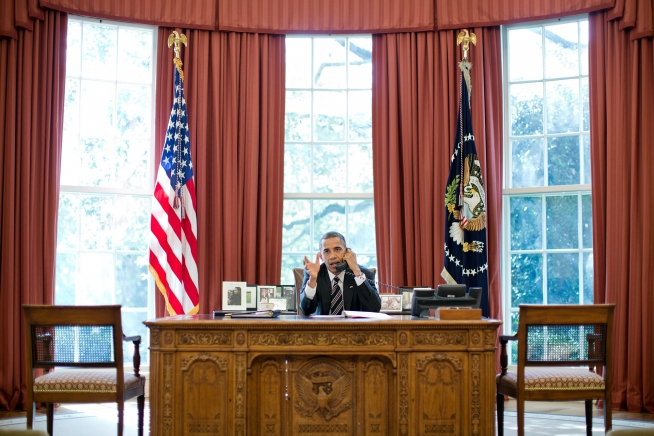
The Obama administration is peddling two scenarios for a potential war in Syria. With news and official statements this week repeating uncorroborated allegations that the Assad regime is moving and mixing elements of chemical weapons and possibly loading the materials into bombs, administration officials warn that the US could intervene militarily (1) if the regime uses these weapons on its own people, and (2) if the danger that these chemical weapons could get into the hands of Islamic militant groups becomes too great.
While it is true that the Obama administration may intervene under scenario (1), public statements to this effect are misleading. Consider Bilal Y. Saab, Executive Director of the Institute for Near East and Gulf Military Analysis, on why Obama’s supposed red line on the use of chemical weapons “lacks credibility.”
Why has the United States drawn a red line here and not elsewhere?
Obama’s words could reflect a humanitarian concern and a moral responsibility to prevent the further loss of life in Syria. Yet the president has not reacted forcefully to the tens of thousands who have already perished without a single poison being used. Chemical weapons are considered weapons of mass destruction, and if used effectively, could kill in the thousands. But so can fighter jets, helicopters, tanks and artillery—and they already have.
Indeed, chemical weapons draw international alarm, but they are no more a threat to civilian life really than what has already been going on in Syria. Additionally, in order to intervene on this basis, the US would have to justify it under the Responsibility to Protect doctrine, which is controversial to say the least. And the intervention would rest on even shakier legal basis because it would be unlikely to receive full support at the UN Security Council.
Even then, the US lacks feasible military options. A no-fly zone is likely to put more civilians at risk, and bombing the chemical stockpiles would be about as bad as Assad unleashing them on his own targets. If the US were to move in with ground forces to secure the weapons, it would take at least 75,000 troops, and any limited mission to secure the weapons would lend itself to mission creep and eventually turn into regime change with no viable interim government, which would then turn into a long and bloody occupation costing hundreds of thousands of lives and trillions of dollars as it did in Iraq.
What about scenario (2)? The Obama administration is playing it off like this is the less important of the two scenarios for intervention, but I’m betting its the more important one, just not for public consumption. In August, Obama said “We cannot have a situation in which [chemical/biological weapons] are falling into the hands of the wrong people.” On Wednesday, Secretary of State Clinton reiterated that “Our concerns are that an increasingly desperate Assad regime might turn to chemical weapons, or might lose control of them to one of the many groups that are now operating within Syria.” Israel’s vice prime minister Moshe Yaalon said on Thursday, “There is speculation that the chemical arsenal will fall into the hostile and irresponsible hands of the likes of al-Qaida or other terrorist groups.”
For those of us that can remember the Bush administration’s justifications for the invasion of Iraq in 2003, this scenario should sound familiar. Three international relations scholars, Paul R. Williams, J. Trevor Ulbrick, and Jonathan Worboys, explain in Foreign Policy how “the Obama administration risks resurrecting the much-maligned Bush Doctrine of preemptive self-defense.”
Under international law, a state may only invoke its right of self-defense in the case of an actual or imminent attack. After the 9/11 attacks by al Qaeda, however, the Bush administration asserted a right of preemptive self-defense against terrorist groups and states that harbor them or could supply them with weapons of mass destruction (WMD). Many states and experts rejected this justification for the 2003 Iraq war because Iraq could not be linked to WMDs or the 9/11 attacks. Unlike Iraq, Syria has CBW and has forged a close partnership with Hezbollah. Nevertheless, preemptive self-defense still suffers from the same theoretical deficiencies it did in 2003. The doctrine has a weak basis in international law and its legal recognition would improperly justify the use of force by powerful states.
The Bush administration’s invasion of Iraq was an outright war crime, resting as it did on fudged evidence of a non-existent threat and, of course, no credible justification of self-defense. The situation with Syria right now isn’t exactly identical, but it’s notable that the Obama administration’s calculations for intervention rest on the same, almost universally reviled war criminal logic as the Bush administration.
In some ways, the current situation is even messier. The Obama administration has explicitly refused to comment “on the specific intelligence” on Syria’s chemical weapons that inflamed so much bluster this week, but Syrian officials continue to emphatically deny any suggestion that they are planning on using them.
“Syria stresses again, for the tenth, the hundredth time, that if we had such weapons, they would not be used against its people. We would not commit suicide,” President Bashar Assad’s deputy foreign minister said on Thursday, adding that the West was whipping up fears as a “pretext for intervention.”
Finally, the US may not have found itself in a situation where Islamic extremist militants in Syria could get a hold of chemical weapons if – for example – the US hadn’t been bolstering these groups as part of the rebel opposition. So, there’s that.





